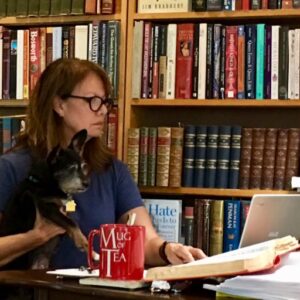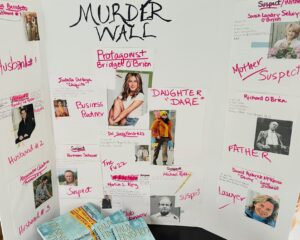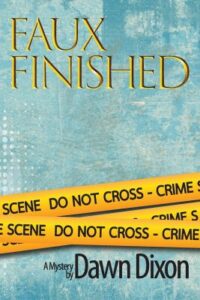 by Dawn Dixon
by Dawn Dixon
“Home again, home again, jiggety-jig,” I mutter unhappily. I drive up to my friend Carol’s smart brick ranch house and cut the engine in the driveway. After the traffic-laden thirty-five-mile slog to Carol’s house, I sit for a couple of minutes shushing my nerves and staring at my paraphernalia in the back seat. This includes copies of my book and a large foam-core-mounted display featuring magazine pictures of the novel’s main characters. Sort of like the board of suspects one sees in a police squad room on TV. My own humble show-and-tell.
Through the bay window I see my hostess, Carol, flitting among her guests. She invited me to speak to her monthly book-club mavens about publishing my new (and first) murder mystery, Faux Finished.
The group had not yet read the book. So, this was, in effect, a dreaded cold call in front of ten strangers. But here’s the thing. While deeply honored she asked me to impart my knowledge as a newly published author, I spent MY WHOLE LIFE avoiding public speaking at all costs. I told Carol this when she made her request. She pooh-poohed my fears.
“For heaven’s sake, Dawn, these are just ordinary people who love to read, like me,” she said. “All you need to do is tell them about yourself and the book. Why you wrote it. How you wrote it. That kind of thing. I told them you’d have copies and would sign any books they might want to buy. Piece of cake.”
I recall these words and I walk toward her house. She streams out the front door in floating yoga-type draperies and holds out her arms to welcome me, a wine glass in her hand. I relax a bit after she laughs at my stricken face and assures me I will not be sacrificed to the book gods. A breezy, confident woman, Carol had been a teacher, and I suppose super organizational and speaking skills come with the territory.
Once I’m in the crowded living room, she hands me a glass of red wine. After a sip or two, I breathe easier. Everyone is cordial. We circle the cheese, nuts, and other nibbly bits on the dining room table. Flowers adorn the counter and the family dog sniffs from one visitor to the other. We find our seats. I sit in front of the fireplace, set up my display, titled “Murder Wall” in heavy black magic marker.
 I created it early in the writing process. I’d imagined my cast of characters a certain way and cut out magazine photos of celebrities or those I felt embodied the characters. I pasted these pictures on eight by ten white paper and taped them to my office wall. It wasn’t fancy. The crookedly written names and their roles in the story helped drive the writing.
I created it early in the writing process. I’d imagined my cast of characters a certain way and cut out magazine photos of celebrities or those I felt embodied the characters. I pasted these pictures on eight by ten white paper and taped them to my office wall. It wasn’t fancy. The crookedly written names and their roles in the story helped drive the writing.
Like I chose a picture of Jennifer Aniston as the protagonist, Bridget, because her movie persona was feisty, appealing, and somewhat ditsy. Henry Fonda I’d pegged as her dad, Richard, a college professor and a deeply trustworthy, kind man. And on and on.
To make the Murder Wall portable, I taped the pictures on foam core. Voila! A visual aid. Always good, I reasoned, in case I panicked during my talk.
By this time the ladies, softened by fruit of the vine and pleasant neighborhood patois, stare curiously at the poster. Carol goes over some club business, saying that after my presentation they will talk about the assigned book they read this past month. She introduces me. They turn toward me expectantly.
I launch into my little speech. You know the one. I’d always loved to read and wanted to write a book, even as child. I went to college as a journalism student and graduated, still wanting to write a book. I got a full-time job, a child, and husband, and that dream sort of faded. Still, I wrote newspaper articles, newsletters, feature pieces, magazine stories, poetry, whatever, on the side. Along the way, I enrolled in online screenwriting courses, went to England to do research, then wrote a historical screenplay, which came to naught after attending a pitch festival in Los Angeles and trying various ways to market it. Finally, I enrolled in an online novel-writing course and got my start. It still took years to finish, during which family problems interrupted my creativity.
“But, here I am, finally,” I say. “I met a small-press publisher willing to take me on, for which I felt so grateful. But even as the book publishes, COVID-19 rages and two fan conferences in which I’m scheduled to participate in 2021 are canceled, and I realize I have to rethink a marketing plan.”
I end my talk with, “And here I thought when I typed The End in early 2021, I was done. I’d written a book. Nothing else to do but write the next one, right? Wrong.”
I read a couple of pages of my murder mystery to the group, careful not to give any of the important plot points away. Trying not to sound monotone. Trying not to act overly dramatic.
When I look up, they give me polite applause. I ask if they have any questions.
 “I know you said you always wanted to write a book. But why did you write this one?”
“I know you said you always wanted to write a book. But why did you write this one?”
Ah. Here she got to the heart of it.
“I set the book where I went to college. I loved those years. In one aspect, the book was an homage to UNC Chapel Hill. I set the time frame during a week of March Madness mania in town. Basketball fanatics live and breathe there, and the UNC-Duke game is always fraught with emotion, and I love UNC basketball. I set the murder scene in a fictitious country club, similar to the one I joined many years ago. This was a life I was familiar with and could describe with irony. With gusto. A family unravels. There’s a difficult teenage daughter, problems with a secretive mother, divorce. I was familiar with those too.”
When I smiled, everyone smiled with me. We all knew about this stuff.
Other questions went as follows:
Q: How do you write? Do you have a regular daily schedule?
A: No. I’m a seat-of-the-pants–a pantser–writer. I write a lot when I do write, but it’s not everyday. I’m hoping on the second book to be more organized though. I might even outline this one. I’ve always hated outlining, so that’s a challenge.
Q: Do you base any of the main characters on real people?
A: Well, without giving too much away, I did base the first victim on a former spouse. But don’t worry. He is very much alive and well today.
They all laugh.
At this point, Carol stands and makes my day. She announces that the book for next month will be my book. I hadn’t expected that. The women line up to buy a signed book. I’m shaking, I’m so proud. One of the women says she has a friend in Chapel Hill who might be interested in doing my book with her book club there. This would be ideal for a whole lot of reasons besides immediate sales, and I tell her to let her friend know I’d love to speak to the Chapel Hill club, too.
When I leave the book club meeting, I start my car in a gleeful frame of mind. This time I’m not muttering; I’m singing, “Home again, home again, jiggety-jig.”
Dawn Dixon (Cotter) won Malice Domestic’s William F. Deeck Grant for Unpublished Writers. Her story, “Under the Boardwalk” appeared in Peace, Love, and Crime: Crime Stories Inspired by the Songs of the 60s. Faux Finished is her first novel. She adores writing screenplays and really bad poetry. Dixon claims Charlotte, North Carolina, as home, and the University of North Carolina at Chapel Hill as her personal utopia. For now, she and her partner rock on the front porch in South Carolina’s Low Country, where she swears the lizards and alligators roam.
